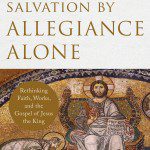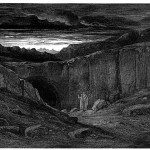This post is part of the Patheos Book Club roundtable discussion of Ghost Brother Angel by Grant Schnarr.
On my to Bryn Athyn, PA, to visit my family with Anne! I’m sitting on a plane as I type this, and I just finished reading Grant Schnarr’s new book, Ghost Brother Angel. Although there are descriptions of strange and possibly paranormal experiences, it is first and foremost a book about family – and in particular, it’s about Grant’s family. As such it hit me personally in a lot of ways, and there was absolutely no way for me to read the book objectively. Grant’s been a personal mentor to me. He and his wife Cathy were a huge support when I battled Hodgkin’s lymphoma, and their son Ronnie is going to be a groomsman in my wedding. He’s like a brother to me.
And the book has me thinking about brotherhood – the “ghost” and “angel” parts of the title play prominent roles, but the key word there is “brother”. It’s about the missing brother in Grant’s life. I hadn’t hear the story before, and it’s a moving one – Grant suggests that the lack of acknowledgment of his older brother who died as a child was the source of a lot of the darkness and fear that clung to him growing up. Whether it really was by supernatural means – which I have no reason to doubt – or simply the psychological process of acknowledging the hole in his life, the book is about a quest for brotherhood and the deep-seated need to have an older brother.
That got me thinking, about what it means to have older brothers. The huge hole in Grant’s life was there because he did have an older brother whose presence was downplayed. I have an older brother, Matthew. But Matthew’s the oldest in the family – he doesn’t have an older brother. And of course there are plenty of boys and men who never had any brothers. But even then there’s a need for men to have that kind of relationship, a relationship of a younger brother to an older one.
That relationship of brotherhood is hard to define. Grant talks about brotherhood in terms of both literal brothers and the brotherly role. Lachy Brown plays a key role in the story, almost as a stand-in for Grant’s brother Bruce, and Grant’s relationship with Lachy grows and deepens at the same time as he’s discovering and creating a bond of brotherhood with his missing brother Bruce.
I know that brotherhood between men is a particular passion for Grant, who leads men’s groups and retreats throughout the year in addition to his work as a minister. It’s impossible to define what makes a relationship a “brotherhood” beyond simply “friendship,” but a few things stand out. Several times Grant talks about the way that Lach chides him and confronts him – always with a sense of humor, but also with a sense of real honesty. I think a key factor of brotherhood (and especially older-brotherhood) as Grant paints it is a willingness to challenge and confront each other in a loving way.
One of the things I have appreciated most from the men who’ve had the biggest impact on my life is that willingness to confront me, even if its uncomfortable, and to do it in a way that comes from love. It’s something that seems to be seriously lacking in the wider culture, and particularly in secular culture.
And what I love about that brotherly relationship is that it isn’t one of absolute authority. The relationship of a father and son, at least in childhood, is one of obedience (or disobedience, as the case may be). One of the great things about brotherhood is that I’m free to talk to and confront my brother with pretty strong words, and he’s under no obligation to obey me – only to listen and consider, and honestly ask himself whether what I’ve said true.
Thinking about that relationship of brother also had me thinking about brotherhood as an expression of something of God. Grant describes one point where he found himself shouting out to his brother Bruce and to God at the same time, asking for a sign from one or the other. The New Church puts a big emphasis on the fact that first and foremost God is our Father, even in His manifestation as Jesus. The disciples never called Jesus “brother,” and He told them that it was right that they should call Him Lord and master, and that they were brothers with one teacher, Christ (Matthew 23:8). From their perspective, He was Lord; but from His perspective, He did call them “friends” and “brothers” (Swedenborg, in Apocalypse Revealed, says, “It is comparatively like the case of a king, prince, or eminent person, who calls his relatives by blood and marriage brothers, even though they do not call him so in return” – a concept understandable but somewhat foreign in modern western culture.) In some sense, He looks at His followers as brothers. And I think about the Lord chastising me in that same brotherly way – telling me to think, encouraging me to make my own decision to do what’s right, to follow Him – that adds another dimension to how I’m able to see Him. Anything good in any family relationship, as I see it, is somehow an image of something we can have in our relationship with God, and to me that’s the best thing to be found in Grant’s book – the picture he paints of the deep need for that relationship of a younger brother to an older one, the relationship where we have someone to look up to, but someone who does not just walk in front of us, but walks beside us too.











